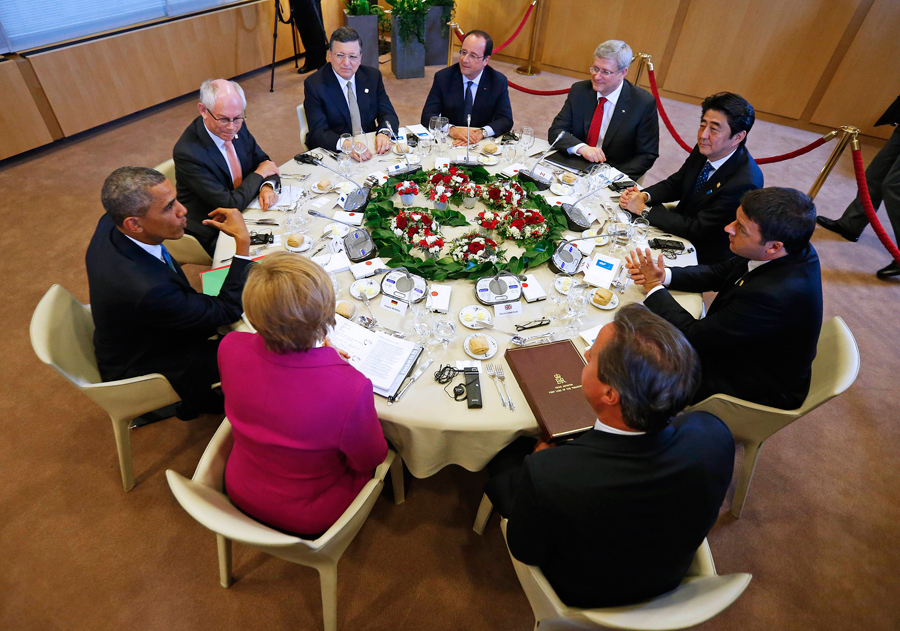China Sea tensions concern G7
Updated: 2014-06-06 10:36
By Tuo Yannan in Brussels, Belgium (chinadaily.com.cn)
|
|||||||||||
|
 |
| (L-R) US President Barack Obama, European Council President Herman Van Rompuy, European Commission President Jose Manuel Barroso, France's President Francois Hollande, Canada's Prime Minister Stephen Harper, Japan's Prime Minister Shinzo Abe, Italy's Prime Minister Matteo Renzi, Britain's Prime Minister David Cameron and Germany's Chancellor Angela Merkel participate in a G7 leaders meeting at European Council headquarters in Brussels June 4, 2014. [Photo/Agencies] |
The Group of Seven (G7) is "deeply concerned" about tensions in the East and South China seas, announced by the leaders of Canada, France, Germany, Italy, Japan, the United Kingdom, the United States, the President of the European Council and the President of the European Commission during G7 meeting.
Due to the Ukraine crisis, instead of holding the meeting in Russia as planned, the summit met in Brussels June 4-5.
In the second day's declaration, G7 leaders said they call on all parties to clarify and pursue their territorial claims, without naming specific countries in its announcement.
"We oppose any unilateral attempt by any party to assert its territorial or maritime claims through the use of intimidation, coercion or force," the leaders said.
According to the declaration, G7 calls for peaceful resolutions, including legal dispute settlement and confidence building measures to solve the tensions.
"We underscore the importance of the freedom of navigation and overflight and also the effective management of civil air traffic based on international law and International Civil Aviation Organization standards and practices."
Foreign Ministry spokesman Hong Lei responded this issue at the ministry's regular press conference the same day that: "China is a staunch champion of peace and stability in the East China Sea and the South China Sea, cooperation and development of regional countries as well as the principles and purposes of the UN Charter, basic norms governing international relations and basic principles of international laws … however, as for the provocative acts taken by certain countries to willfully violate China's sovereignty and rights and interests as well as deliberately undermine maritime peace and stability, China will respond with firm resolve."
Hong also mentioned that the internationalization of relevant disputes, as well as the interference and involvement of irrelevant parties, …" is neither helpful in solving the disputes nor in realizing regional peace and stability, only making the problem more difficult to settle.
"Countries outside this region should respect facts on relevant controversial issues and adhere to an objective attitude instead of deliberately hyping up tension, stirring up confrontation or complicating the regional situation," he said.
Today's Top News
Vets flock to Normandy to remember D-Day
G7 'deeply concerned' about S China Sea tensions
Ukraine tightens control on border
Silk Road offers Sino-Arab blueprint
Clinton 'loves to see' female leader
US says to work with Egypt's president-elect
Oversight of military firms on rise in China
Abbott aiming to mend ties with Jakarta
Hot Topics
Lunar probe , China growth forecasts, Emission rules get tougher, China seen through 'colored lens', International board,
Editor's Picks

|

|

|

|

|

|





